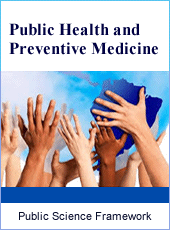Public Health and Preventive Medicine
Articles Information
Public Health and Preventive Medicine, Vol.1, No.3, Aug. 2015, Pub. Date: Aug. 5, 2015
Assessment of Patients’ Knowledge and Attitude Regarding Pulmonary Tuberculosis
Pages: 130-136 Views: 5373 Downloads: 1828
[01]
Mohammed Ateeg, Community Health Nursing Department, Faculty of Nursing, Sudan International University, Khartoum, Sudan.
[02]
Bothyna Bassyonie, Community Health Nursing Department, Faculty of Nursing, Aljazeera University, Madani, Sudan.
[03]
Mugahed Al-khader, Medical Surgical Nursing Department, Faculty of Nursing, Sudan International University, Khartoum, Sudan.
Introduction: Tuberculosis (TB) is an infectious disease which is transmitted through air; TB is a public health priority in Sudan which is a major cause of morbidity and mortality in Sudan, the present study aimed to assess Patients’ Knowledge and Attitudes regarding nursing care in tuberculosis Sudanese patients. Methods: A descriptive cross sectional hospital based study conducted in Bahri teaching hospital and alshaab teaching hospital, Khartoum- Sudan, between Septembers to November 2014. The sample size consisted of 110 patients’ from the tuberculosis units, Data were collected by using questionnaire designed for the study. Analysis was performed by statistical package for social sciences (SPSS version 20). Results: Of 110 patients interviewed, results revealed that only (18.2%) of the study sample know the definition of tuberculosis, and (56.4%) of them responded correctly regarding causes of tuberculosis, (20.0%) of the study sample regarding mode of transmission of tuberculosis, and (77.3%) of them responded with correctly answers regarding period for treatment tuberculosis, and (40.0%) of the study sample responded correctly answers regarding to attitude of eating with family member and (32.7%) of them responded correctly answers regarding stopped medication due to feeling of worse, and (39.1%) of the study sample responded correctly stated regarding that medication are better and (40.0%) of they stopped, (40.9%) of them responded correctly regarding they did not get worry after having the tuberculosis, and (46.4) of the study sample responded correct stated regarding that care of tuberculosis (cover sputum, avoid crowded). the respondents have attitudes towards the health facilities and health care provided. Attitude to treatment was not satisfactory. Conclusion: The study concluded that patients ’knowledge and attitude regarding tuberculosis are inadequate, it recommended that periodic health education to patient and their families about tuberculosis care, should be done more research on the area to identify the factors that affecting non adherence to treatment and care of tuberculosis during the disease.
Tuberculosis, Knowledge, Attitudes, Nursing, Sudan
[01]
Bayoumi, A., Mohamed, A.I., Ottoa, P. and Yousif, M.A. (2007). Knowledge of TB: “A survey among tuberculosis patients in Omdurman, Sudan.” Sudanese Journal of Public Health, 2(1)
[02]
Ducati, R.G., Netto, R.A., Basso, L.A. and Santos, D.S. (2008). “The resumption of consumption- A review on tuberculosis”. Mem Inst Oswaldo Cruz, Rio de janeiro. 101 (7): 697-714.
[03]
Dodor EA, Afenyandu GY (2007). “Factors associated with tuberculosis treatment default and completion at Effia-Nkwanta Regional Hospital in Ghana.” Trans R Soc Trop Med Hygiene, 99(11):827-832.
[04]
Daniel OJ, Oladapo OT, Alausa OK: (2008). “Default from treatment programme in Sagamu, Nigeria”. Nigeria Journal of Medicine, 15(1):637.
[05]
El-Sony AI (2009). “The cost to health services of human immunodeficiency virus (HIV) co-infection among tuberculosis patients in Sudan”. Health Policy, 75(3):272-279.
[06]
Federal Ministry of Health, Sudan (2007), National Health Information Center. Annual Statistical Report, 2007.
[07]
Federal Ministry of Health, Sudan (2008), National Health Information Center. Annual Statistical Report, 2008
[08]
FitzGerald, JM; Wang, L, Elwood, RK (2009). "Tuberculosis: 13. Control of the disease among aboriginal people in Canada.". Canadian Medical Association Journal 162
[09]
Hoa NP, Thorson AE, Long NH, Diwan VK (20012).” Knowledge of tuberculosis and associated health-seeking behaviour among rural Vietnamese adults with a cough for at least three weeks”. Scand J Public Health Suppl 2012, 62:59-65
[10]
Koay, T.K. (2004). “Knowledge and attitudes towards tuberculosis among the people living in Kudat, Sabah”. Med J Malaysia, 59(4): 502-506.
[11]
Lienhardt, C. (2008). “From exposure to disease: the role of environmental factors in susceptibility to and development of tuberculosis”. Epidemiologic Review, 23 (2) 288-301).
[12]
Lönnorth, K., Jaramilo, E., Williams, B.G., Dye, C. and Raviglione, M. (2009). “Drivers of tuberculosis epidemics: The role of risk factors and social determinates”. Social Science and Medicine, 68: 2240-2246.
[13]
Mukundi P. Knowledge, attitudes and practices among newly diagnosed Tuberculosis patients in selected public hospitals in Nyeri district.
[14]
Maalaoui N: Strengthening TB (2009). Drug Management in the Sudanese National TB Control Program: In-Depth Review of TB Drug Management, Khartoum, November 10-23, 2008. Arlington, Va; 2009.
[15]
Martinson, N. (2009). Tuberculosis in South Africa: Pandora’Box? .Sacema Quarterly. Issue 3, September 2009.).

ISSN Print: 2381-778X
ISSN Online: 2381-7798
Current Issue:
Vol. 7, Issue 3, September Submit a Manuscript Join Editorial Board Join Reviewer Team
ISSN Online: 2381-7798
Current Issue:
Vol. 7, Issue 3, September Submit a Manuscript Join Editorial Board Join Reviewer Team
| About This Journal |
| All Issues |
| Open Access |
| Indexing |
| Payment Information |
| Author Guidelines |
| Review Process |
| Publication Ethics |
| Editorial Board |
| Peer Reviewers |


